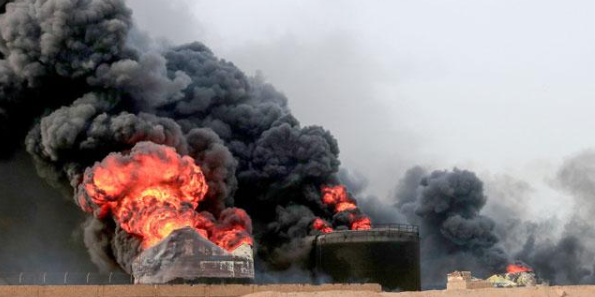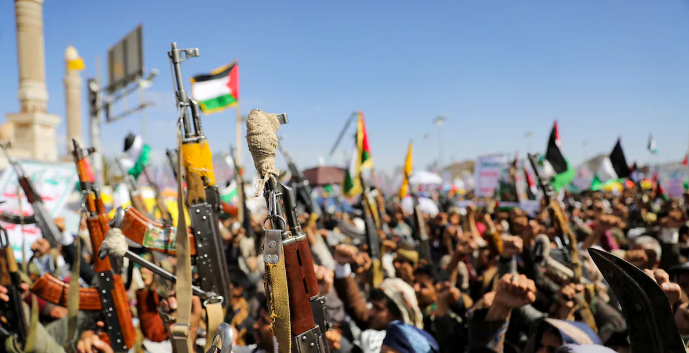Houthis Pledge Massive Response to Israeli Strikes:-
In a region already fraught with tension, recent developments have escalated the situation further. The Houthis, a rebel group based in Yemen, have vowed a significant response to recent Israeli strikes. This pledge marks a potentially dangerous escalation in the Middle Eastern conflict, raising concerns about a broader regional confrontation. In this article, we delve into the background of the conflict, the reasons behind the Houthis’ declaration, and the potential implications for regional stability.
Background: The Houthis and the Israeli Strikes
The Houthis Pledge officially known as Ansar Allah, are a Shia Muslim rebel group from northern Yemen. They have been engaged in a protracted conflict with the Yemeni government, which has been supported by a coalition led by Saudi Arabia and backed by the United States and other Western nations. The conflict, which began in earnest in 2014, has led to a severe humanitarian crisis in Yemen, with millions displaced and widespread suffering.
The recent Israeli strikes are part of a broader pattern of military actions in the region. Israel has conducted numerous operations against groups it considers threats to its security, including Hezbollah in Lebanon and various militias in Syria. These strikes are often aimed at preventing the transfer of advanced weaponry and curbing the influence of Iran, a key supporter of many of these groups, including the Houthis.  for more information click on this link
for more information click on this link
The Houthis’ Pledge of Response
In a statement broadcast on Houthi-controlled media, the group’s leader, Abdul-Malik al-Houthi, declared that their response to the Israeli strikes would be “huge” and “unprecedented.” He accused Israel of aggression and warned that the Houthis would not stand idly by while their interests were attacked.
“Our response will be massive and will shake the enemy,” a l Houthi -proclaimed. “We have the capability and the resolve to defend ourselves and to retaliate against any aggression.”
Why Now? Timing and Motivations
The timing of the Houthis’ pledge is significant and can be attributed to several factors:
- Escalating Tensions: The Middle East has seen a surge in tensions in recent months, with various actors vying for influence and power. The Houthis’ declaration can be seen as a response to this broader environment of hostility and confrontation.
- Solidarity with Iran: Iran is a key backer of the Houthis, providing them with financial, logistical, and military support. The Houthis’ strong response aligns with Iran’s broader strategy of challenging Israeli and Saudi influence in the region.
- Strategic Positioning: By pledging a significant response, the Houthis aim to strengthen their position both domestically and internationally. Domestically, it serves to bolster their image as defenders of Yemeni sovereignty. Internationally, it signals their capability and willingness to strike back, potentially deterring further aggression.
 for more information click on this link
for more information click on this link
Regional Implications
The Houthis’ pledge of a massive response has several potential implications for the region:
- Increased Hostilities: A direct retaliation by the Houthis could lead to an escalation in hostilities. This could involve missile strikes or attacks on key infrastructure, further destabilizing an already volatile region.
- Broader Regional Conflict: The Middle East is a complex web of alliances and enmities. An escalation involving the Houthis and Israel could draw in other regional actors, including Saudi Arabia, Iran, and various proxy groups, potentially leading to a broader regional conflict.
- Humanitarian Impact: Yemen is already experiencing one of the world’s worst humanitarian crises. An escalation in conflict could exacerbate the suffering, leading to more civilian casualties and displacement.
- Global Energy Markets: Yemen’s strategic location near key shipping lanes means any significant conflict could disrupt global energy markets, affecting oil prices and international trade.
International Reactions
The international community has reacted with concern to the Houthis’ pledge. The United Nations, which has been attempting to broker peace in Yemen, has called for restraint and urged all parties to avoid further escalation.
“Any escalation in the region is deeply worrying,” said a spokesperson for the UN Secretary-General. “We urge all parties to refrain from actions that could lead to further instability and suffering.”
The Houthis Pledge United States, a key ally of Israel and supporter of the Saudi-led coalition in Yemen, has also expressed concern. “We are closely monitoring the situation,” said a State Department official. “We call on all parties to de-escalate and pursue peaceful resolutions to their conflicts.”
Historical Context: A Longstanding Struggle
The Houthis Pledge current tensions are part of a broader historical context of conflict and rivalry in the Middle East. The Houthis’ rise to power in Yemen and their subsequent conflict with the Saudi-led coalition is part of a larger struggle for influence between Saudi Arabia and Iran, often seen as a proxy war between the two regional powers.
Israel’s military actions in the region are also part of its long-standing policy of preemptive strikes against perceived threats. These actions are aimed at maintaining its security and deterring hostile actors, but they also contribute to the cycle of retaliation and escalation.
The Houthis’ Capabilities
The have demonstrated significant military capabilities over the years, including the use of ballistic missiles, drones, and other advanced weaponry. They have carried out numerous attacks against Saudi Arabia, targeting military installations, oil facilities, and civilian infrastructure.
Houthis Pledge Their ability to strike back at Israel is more limited due to geographical distance and Israel’s advanced defense systems. However, the Houthis could potentially target Israeli interests in the region, such as shipping lanes in the Red Sea or embassies and other assets in countries with Houthi sympathizers.
The Path Forward
As the Houthis Pledge situation develops, the key question remains: How will the Houthis respond, and what will be the consequences of their actions? The potential for a significant escalation looms large, but there are also opportunities for diplomacy and de-escalation.
- Diplomatic Efforts: The international community, particularly the UN and major powers, must ramp up diplomatic efforts to prevent an escalation. This includes pressuring all parties to engage in dialogue and seek peaceful solutions.
- Humanitarian Assistance: Regardless of the outcome, the humanitarian situation in Yemen needs urgent attention. Increased international aid and efforts to ensure the delivery of humanitarian assistance are crucial.
- Regional Dialogue: Long-term stability in the region requires addressing the underlying issues driving the conflict. This includes fostering dialogue between Saudi Arabia and Iran, supporting peace initiatives in Yemen, and addressing broader security concerns in the region.
Conclusion: A Critical Juncture
The Houthis’ pledge of a massive response to Israeli strikes marks a critical juncture in the ongoing conflict in the Middle East. As tensions rise, the potential for a broader regional conflict increases, with serious implications for stability and security.
The international community must act swiftly and decisively to prevent an escalation, promote dialogue, and address the humanitarian crisis in Yemen. The path forward is fraught with challenges, but with concerted effort and diplomacy, it is possible to navigate this volatile situation and work towards a more stable and peaceful region.
In the meantime, all eyes will be on the Houthis and their next move. The coming days and weeks will be crucial in determining the trajectory of this conflict and the prospects for peace in the Middle East. ALSO READ:- International Court of Justice Declares Israeli Occupation in Palestine ‘Ille 2024




